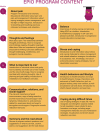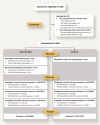Living well with chronic pain: a 12-month randomized controlled trial revealing impact from the digital pain self-management program EPIO
- PMID: 38962688
- PMCID: PMC11221858
- DOI: 10.1097/PR9.0000000000001174
Living well with chronic pain: a 12-month randomized controlled trial revealing impact from the digital pain self-management program EPIO
Abstract
Introduction: Chronic pain affects a wide range of physical and psychological aspects of life for those impacted. Psychosocial treatment approaches may be of support, but outreach is still limited.
Objectives: To evaluate the efficacy of EPIO, an evidence-informed, user-centered digital self-management intervention for people with chronic pain, in a 12-month randomized controlled trial.
Methods: People living with chronic pain (N = 266) were randomized to the EPIO intervention (n = 132) or a usual-care control group (n = 134). The intervention was delivered in a simple blended care model, and outcome measures collected at baseline, 6 months, and 12 months. Generalized linear models for repeated measures were fitted to compare groups over time.
Results: Participants were primarily female (81%), median age 49 years (range 22-78), with heterogeneous pain conditions, and had lived with pain >5 years (77.6%). A mixed linear model with all timepoints included revealed no statistically significant group differences for the primary outcome of pain interference. Significant psychological benefits in favor of the intervention group were however detected for depression (P = 0.022), self-regulatory fatigue (P = 0.024), vitality (P = 0.016), and mental health (P = 0.047). Baseline to 12-month changes showed additional favorable effects for anxiety (between-group mean differences [MDs] = 0.79, P = 0.047), depression (MD = 1.08, P = 0.004), self-regulatory fatigue (MD = 2.42, P = 0.021), pain catastrophizing (MD = 2.62, P = 0.009), and health-related quality of life.
Conclusions: The EPIO program aims to improve outreach of evidence-based pain self-management interventions. Findings demonstrate how using EPIO can lead to sustainable psychological change, enhancing mental health and health-related quality of life for people suffering from pain, providing a chance to live well with the pain.
Keywords: Acceptance and commitment therapy; Anxiety; Chronic pain; Cognitive behavioral therapy; Depression; Digital pain self-management; Pain interference; Psychosocial self-management; Self-regulatory fatigue; eHealth.
Copyright © 2024 The Author(s). Published by Wolters Kluwer Health, Inc. on behalf of The International Association for the Study of Pain.
Conflict of interest statement
L.S.N. is an unpaid board member of the company dHealth AS, aiming to market the EPIO program for commercialization, but has no financial interest in the company. The remaining authors have no conflicts of interest to declare. This study was funded by the Norwegian Research Council (Grant #256574, Principal Investigator L.Solberg Nes). Data sets from this study are, due to the nature of patient sensitive information, not available for public sharing through public archives or repositories. Deidentified data from this study will however be made available in accordance with institutional standards through contacting the corresponding author. Trial Registration: ClinicalTrials.gov NCT03705104.Sponsorships or competing interests that may be relevant to content are disclosed at the end of this article.
Figures
References
-
- Aerts JEM, Dam AV. Blended e-Health in cognitive behavioural therapy: usage intensity, attitude and therapeutic alliance in clinical practice. Psychology 2018;09:2422–35.
-
- Baumeister RF, Bratslavsky E, Muraven M, Tice DM. Ego depletion: is the active self a limited resource? J Pers Soc Psychol 1998;74:1252–65. - PubMed
-
- Baumeister RF, Tice DM, Vohs KD. The strength model of self-regulation: conclusions from the second decade of willpower research. Perspect Psychol Sci 2018;13:141–5. - PubMed
LinkOut - more resources
Full Text Sources
Research Materials
Miscellaneous



